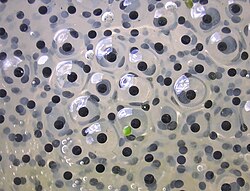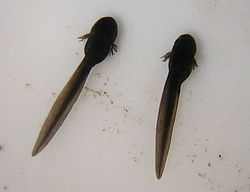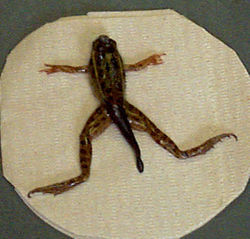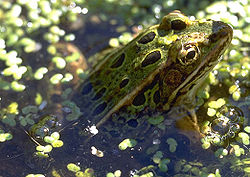Latest revision as of 12:26, 21 September 2021
Information about message (contribute ) This message has no documentation.
If you know where or how this message is used, you can help other translators by adding documentation to this message.
Message definition (AY Honors/Life cycle of a frog )
</noinclude>
</noinclude>
===Frogs===
[[Image:Frogspawn closeup.jpg|190px|thumb|Frogspawn]]
[[Image:Tadpoles 10 days.jpg|190px|thumb||10 days: Tadpoles]]
[[Image:Frog-Zhe.jpg||190px|thumb|8–12 weeks: Froglet]]
[[Image:Green-leopard-frog-in-swamp.jpg||190px|thumb|12–16 weeks: Adult frog]]
The life cycle of frogs, like that of other amphibians, consists of four main stages: egg, tadpole, metamorphosis and adult. The reliance of frogs on an aquatic environment for the egg and tadpole stages gives rise to a variety of breeding behaviors that include the well-known mating calls used by the males of most species to attract females to the bodies of water that they have chosen for breeding. Some frogs also look after their eggs—and in some cases even the tadpoles—for some time after laying. Ranas 12–16 semanas: Rana adulta
El ciclo de vida de las ranas, como la de otros anfibios, consta de cuatro etapas principales: huevo, renacuajo, metamorfosis y adulto. La dependencia de las ranas de un medio acuático para las etapas de huevo y renacuajo da lugar a una variedad de comportamientos de reproducción que incluye las llamadas de apareamiento que usan los machos de la mayoría de las especies para atraer a las hembras al agua para la reproducción. Algunas ranas también cuidan de sus huevos y, en algunos casos, cuidan los renacuajos.




